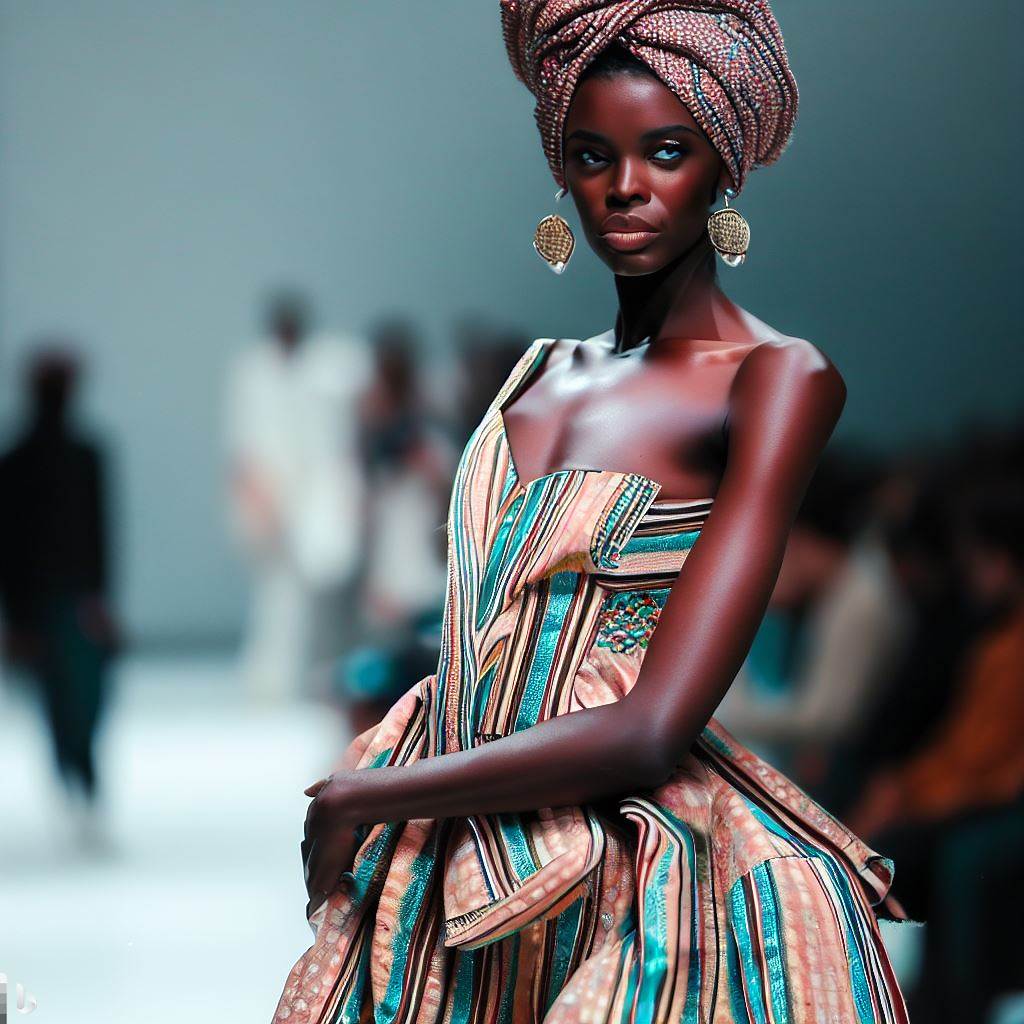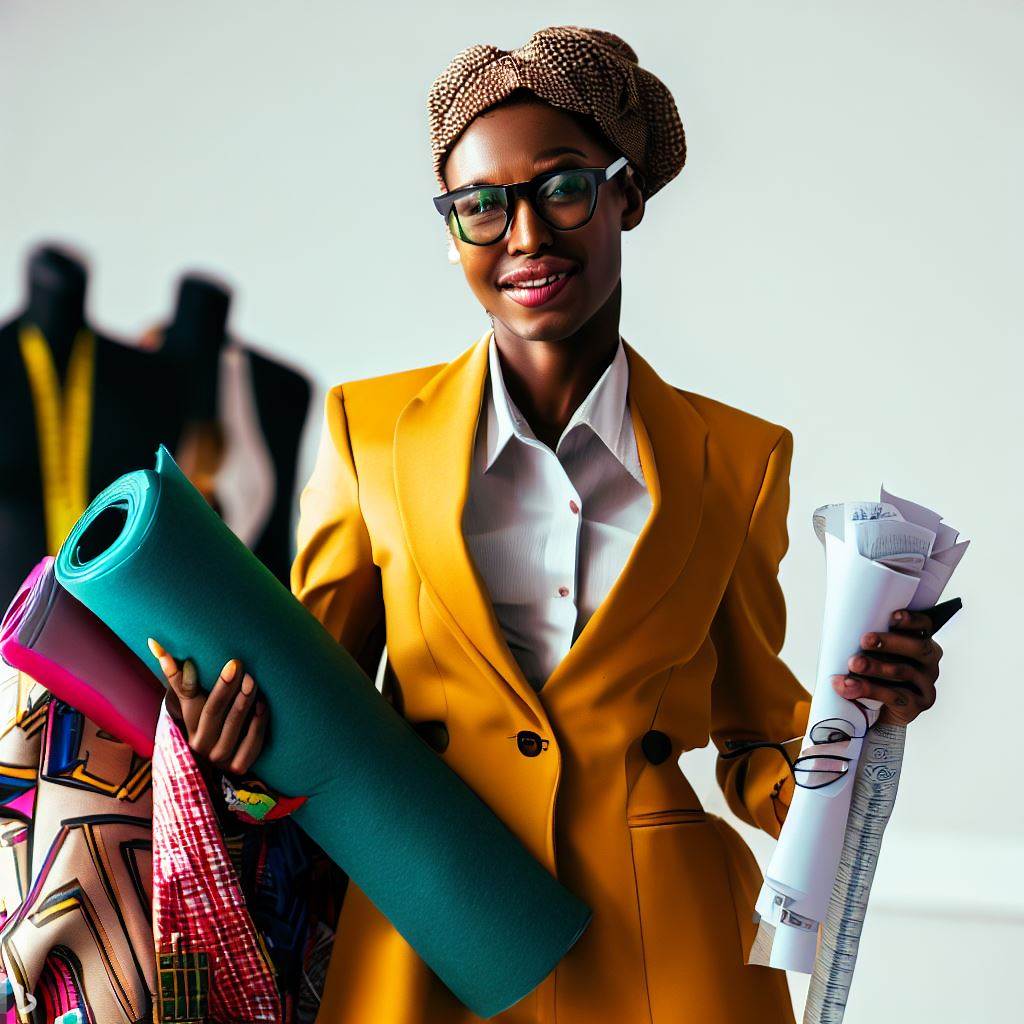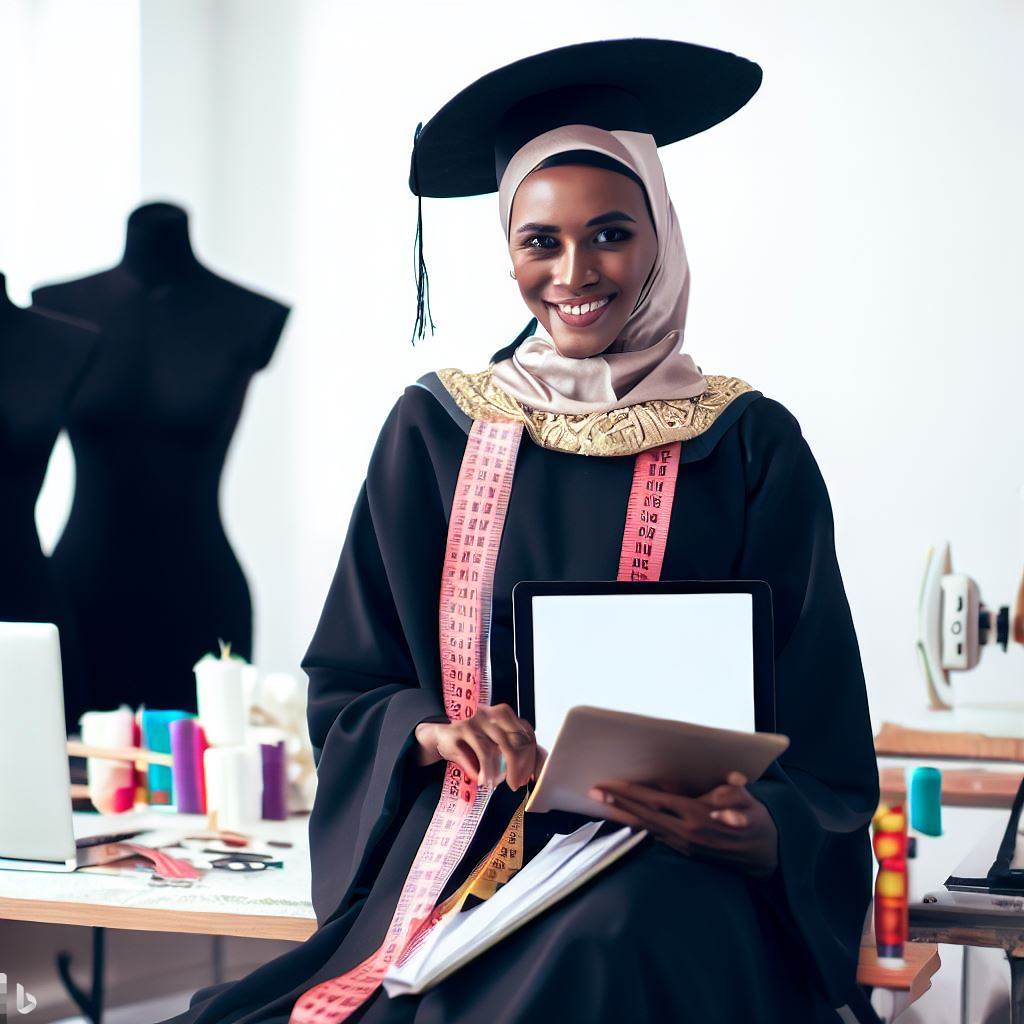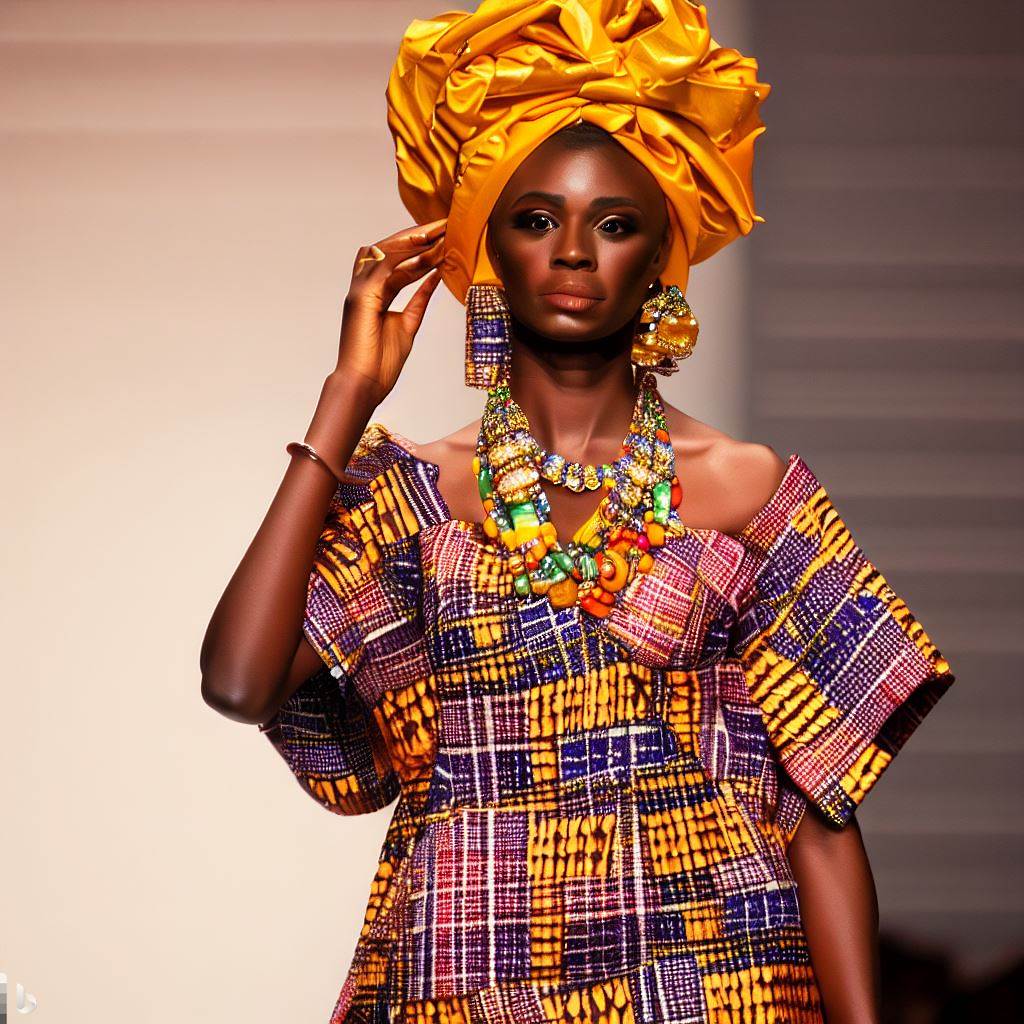Introduction
Fashion design in Nigeria is a flourishing industry, making a significant impact globally.
The country’s rich cultural heritage, diverse ethnic groups, and vibrant fashion styles have contributed to the rise of Nigerian fashion designers on the global stage.
With their unique creativity and innovative designs, Nigerian designers have gained international recognition and are now making waves in the fashion industry worldwide.
Thesis Statement
Fashion design in Nigeria is a career with global impact, showcasing the nation’s talent, culture, and contributing to economic growth.
In this section, we will explore the various aspects that make fashion design in Nigeria a career with global impact, including the influence of Nigerian fashion on international runways, the use of traditional African fabrics and techniques, and the economic opportunities it presents for designers and the nation as a whole.
We will also analyze the challenges faced by Nigerian fashion designers and their strategies for overcoming them.
Join us on this exciting journey as we delve into the world of Nigerian fashion design and discover why it is a career path that holds immense potential and global influence.
Stay tuned for the next sections where we will delve deeper into the impact of Nigerian fashion designers on the global fashion scene.
Get ready to be inspired by the creativity and talent that emanates from this vibrant industry.
Overview of the Fashion Design Industry in Nigeria
A. Historical background
Fashion Design in Nigeria has a rich historical background that dates back to ancient times.
Nigerian tribes had unique clothing styles and techniques, showcasing their cultural heritage.
B. Growth and development
Over the years, the Fashion Design industry in Nigeria has experienced significant growth and development.
The introduction of fashion schools and design competitions has nurtured young talents and improved the overall industry standards.
C. Importance in Nigerian culture
Fashion design holds immense cultural importance in Nigeria, reflecting the nation’s heritage and identity through attire.
Traditional garments like agbada, buba, and iro are deeply esteemed and worn on special occasions.
Nigerian fashion designers have gained global acclaim, establishing the country as a hub for creative and innovative designs.
In recent years, the Nigerian government has endorsed the fashion design industry, recognizing its potential for economic growth and job creation.
They’ve allocated funds and resources to support budding designers, fostering entrepreneurship and innovation.
Nigerian fashion design has not only thrived domestically but has also left an indelible global mark.
Renowned fashion publications showcase these designers, who collaborate with global brands, elevating their international recognition.
The industry has played a pivotal role in celebrating cultural diversity and inclusivity.
Nigerian designers draw inspiration from the nation’s various ethnic groups, incorporating traditional patterns, fabrics, and motifs into their creations.
This fusion produces a distinctive and vibrant fashion aesthetic celebrated worldwide.
With the advent of social media, Nigerian fashion designers have expanded their reach, attracting followers and customers worldwide.
Social platforms serve as a showcase for their designs, allowing them to connect with potential clients and partner with influencers and celebrities.
Moreover, the fashion design sector has contributed significantly to job creation and empowerment.
Many young Nigerians have found employment opportunities as models, fashion stylists, photographers, and makeup artists.
This has curtailed unemployment rates and improved the livelihoods of those within the industry.
To summarize, Nigeria’s fashion design industry has experienced exponential growth, leaving an enduring global impression.
Its historical roots, evolution, cultural significance, and government support have shaped it into a thriving sector.
Nigerian fashion designers persistently introduce distinct and creative designs on the global stage, upholding their influence.
Read: Becoming a Fashion Designer in Nigeria: A Beginner’s Guide
Global Impact of Nigerian Fashion Design
In this section, we will explore the global impact of Nigerian fashion design, focusing on the recognition and influence on international runways, the economic benefits and export opportunities, and the promotion of Nigerian culture globally.
A. Recognition and Influence on International Runways
- Nigerian fashion designers have gained international recognition for their unique and innovative designs.
- They have showcased their collections at prestigious fashion weeks and events around the world.
- By participating in international runways, Nigerian fashion design has become a part of the global fashion conversation.
- Their bold and vibrant patterns, colors, and fabrics have captivated international audiences.
- Nigerian designers have also influenced international fashion trends, inspiring designers from other countries.
B. Economic Benefits and Export Opportunities
- The success of Nigerian fashion design has led to significant economic benefits for the country.
- Through exports, Nigerian designers have been able to generate revenue and contribute to the growth of the fashion industry.
- International collaborations and partnerships have opened up new markets for Nigerian fashion designers.
- These opportunities have not only increased the designers’ income but also provided employment opportunities for local artisans.
- The fashion industry has become a major contributor to Nigeria’s economic development and diversification.
C. Promotion of Nigerian Culture Globally
- Nigerian fashion design has become a powerful tool in promoting the rich cultural heritage of the country.
- Designers incorporate traditional Nigerian elements into their designs, showcasing the diversity and beauty of Nigerian culture.
- Through fashion, Nigerians are able to express their identity and pride in their heritage.
- International recognition of Nigerian fashion has created a platform for cultural exchange and appreciation.
- It has helped debunk stereotypes and showcase the artistic talent and creativity of Nigerians.
In essence, Nigerian fashion design has had a significant global impact. It has gained recognition and influenced international runways, creating a space for Nigerian designers in the global fashion industry.
The success of the industry has also resulted in economic benefits, contributing to Nigeria’s economic growth.
Additionally, Nigerian fashion design has become a powerful tool for promoting Nigerian culture globally, allowing Nigerians to showcase their heritage and challenge stereotypes.
Overall, the global impact of Nigerian fashion design cannot be underestimated, and it continues to make waves on the international stage.
Read: The Influence of Naija Pidgin on Copywriting in Nigeria
Career opportunities in Nigerian Fashion Design
A. Job prospects for fashion designers in Nigeria
- Fashion designers in Nigeria have a wide range of job prospects in various sectors.
- They can work in fashion houses, design studios, or start their own businesses.
- Many designers also work as freelancers, catering to individual clients or celebrities.
- The fashion industry in Nigeria is growing rapidly, creating more job opportunities for designers.
- Designers can specialize in different areas such as clothing, footwear, accessories, or costume design.
B. Fashion houses and brands making waves internationally
- Several Nigerian fashion houses and brands have gained global recognition and are making waves internationally.
- Designers like Lisa Folawiyo, Deola Sagoe, and Tiffany Amber have showcased their work on international runways.
- These designers have been featured in major fashion publications and have dressed international celebrities.
- Nigerian brands like Maki Oh, Bridget Awosika, and Orange Culture have also gained international acclaim.
- These brands combine African aesthetics with modern designs, appealing to a global audience.
C. Collaboration with international designers and brands
- Nigerian fashion designers often collaborate with international designers and brands to expand their reach.
- Such collaborations provide exposure to new markets and allow designers to learn from global counterparts.
- Designers like Lanre Da Silva Ajayi and Mai Atafo have collaborated with international brands like L’Oréal and H&M.
- These collaborations not only benefit the Nigerian designers but also contribute to the growth of the global fashion industry.
- By collaborating, Nigerian designers are able to showcase their talent and promote Nigerian fashion on a global scale.
Read: Top 10 Nigerian Fashion Designers You Should Know About

Challenges and Obstacles in the Nigerian Fashion Design industry
A. Infrastructure and resources
- Inadequate infrastructure such as reliable power supply and transportation hinders production and delivery.
- Limited financial resources make it difficult for designers to invest in modern equipment and technology.
- Lack of proper storage facilities and warehouses affects inventory management and distribution.
B. Lack of formal education and training
- Many aspiring fashion designers in Nigeria lack access to quality formal education in the field.
- Limited opportunities for vocational training leave designers without essential technical skills.
- The absence of specialized fashion design courses in universities limits knowledge and creativity.
C. Limited access to global markets
- Nigerian fashion designers face challenges in reaching international customers due to limited exposure.
- High costs of exporting finished products hinder designers from accessing global markets effectively.
- Lack of trade agreements and connections with international retailers restricts market opportunities.
Overcoming challenges
1. Infrastructure and resources
- Government and private sector collaboration can improve infrastructure through investment in power and transportation.
- Fashion design associations can provide shared resources and equipment, reducing financial burdens for designers.
- Utilizing technology platforms for e-commerce and online stores can help designers overcome storage and distribution challenges.
2. Lack of formal education and training
- Fashion design institutions and organizations should offer scholarships and sponsorships to deserving students.
- Government and industry partnerships can establish vocational training centers to enhance technical skills.
- Universities should introduce fashion design programs and promote creativity in their curriculum.
3. Limited access to global markets
- Nigerian fashion designers should participate in international trade fairs and fashion weeks to gain exposure.
- Collaboration with export agencies can assist designers in navigating complexities of international markets.
- Government authorities should negotiate favorable trade agreements and establish connections with global retailers.
In short, despite challenges, the Nigerian Fashion Design industry has immense potential.
With proper support and initiatives, infrastructure can be improved, education opportunities can expand, and access to global markets can increase.
Nigerian designers have the talent and creativity to make a significant impact on the global fashion scene.
By addressing these challenges, the industry can thrive and create a lasting global impact.
Read: Required Skills for a Television Editor in Nigeria
You Might Also Like: Nigerian Graphic Designers: Influencing Global Design Trends
Initiatives and Support for Nigerian Fashion Designers
A. Government Policies and Programs
- The Nigerian government has implemented policies and programs to support the growth of the fashion industry.
- The Ministry of Industry, Trade, and Investment provides grants and funding opportunities for fashion designers.
- The government also organizes training and skill development programs to enhance the capabilities of local designers.
B. Non-profit Organizations Promoting Local Talent
- Non-profit organizations like the Fashion Designers Association of Nigeria (FADAN) play a crucial role in supporting Nigerian designers.
- FADAN offers mentorship programs, workshops, and access to resources for aspiring designers.
- These organizations create platforms for designers to showcase their work and connect with industry professionals.
C. Fashion Events and Platforms Showcasing Nigerian Designers
- Lagos Fashion Week is a major fashion event in Nigeria that provides a platform for both emerging and established designers.
- It attracts international buyers and media attention, creating opportunities for Nigerian designers to showcase their collections.
- Other fashion events like Arise Fashion Week and GTBank Fashion Weekend also promote Nigerian talent on global platforms.
- Fashion platforms such as African Fashion International (AFI) and Vogue Talents Africa actively seek out and showcase Nigerian designers.
- They provide exposure to the international market and help establish the global reputation of Nigerian fashion.
- Social media platforms like Instagram have become important tools for Nigerian designers to gain visibility and reach a wider audience.
- Nigerian designers use Instagram to share their work, connect with potential customers, and collaborate with influencers.
- International collaborations with established fashion brands and designers have also opened doors for Nigerian talent.
- Designers like Lisa Folawiyo and Tiffany Amber have collaborated with global fashion houses, gaining recognition and expanding their reach.
- The rise of e-commerce platforms has made it easier for Nigerian designers to sell their creations globally.
- Platforms like Konga, Jumia, and Oxosi provide a convenient way for designers to reach customers beyond Nigeria’s borders.
- Cultural initiatives like the “Wear Nigerian” campaign encourage Nigerians to support local designers and promote the country’s fashion industry.
- The Nigerian government has also initiated the “Made in Nigeria” campaign to encourage the consumption of locally produced goods, including fashion.
- These initiatives and support systems are crucial in empowering Nigerian fashion designers and helping them create a global impact.
Ultimately, Nigerian fashion designers benefit from initiatives like government policies, non-profits, fashion events, and digital platforms.
These collectively enhance their global success potential.
Success Stories of Nigerian Fashion Designers
A. Highlighting renowned Nigerian designers
- Deola Sagoe: Known for her innovative designs combining traditional Nigerian fabrics and modern silhouettes.
- Lisa Folawiyo: Gained international recognition for her use of vibrant prints and embellishments.
- Mai Atafo: A popular menswear designer known for his impeccable tailoring and attention to detail.
- Maki Oh: Adored by celebrities for her unique blend of African aesthetics with contemporary designs.
- Tiffany Amber: Pioneered the ready-to-wear industry in Nigeria and showcased at top fashion weeks around the world.
B. Their contributions to the global fashion industry
- These designers have put Nigerian fashion on the map, gaining recognition at international fashion events.
- They have brought Nigerian culture to the forefront by incorporating traditional fabrics and techniques.
- Their designs have showcased the creativity and craftsmanship present in Nigeria’s fashion industry.
- By successfully exporting their designs, they have contributed to the growth of Nigeria’s economy.
- They have inspired aspiring designers in Nigeria and beyond to pursue fashion as a career.
C. Lessons to be learned from their journeys
- Passion and dedication are crucial to succeed in the competitive fashion industry.
- Having a unique and authentic vision sets designers apart and attracts global attention.
- Embracing one’s cultural heritage can be a powerful source of inspiration and differentiation.
- Building strong networks and collaborations can open doors to global opportunities.
- Continuous learning, adapting to industry trends, and embracing innovation are keys to long-term success.
The success stories of Nigerian fashion designers showcase the immense talent and creativity present in the industry
Deola Sagoe, known for her innovative designs combining traditional Nigerian fabrics and modern silhouettes, has gained international recognition for her work.
Lisa Folawiyo, on the other hand, is celebrated for her use of vibrant prints and embellishments in her designs.
Mai Atafo, a popular menswear designer, is acclaimed for his impeccable tailoring and attention to detail.
Maki Oh is another renowned designer adored by celebrities for her unique blend of African aesthetics with contemporary designs.
Tiffany Amber, a pioneer in the ready-to-wear industry in Nigeria, has showcased her designs at top fashion weeks around the world.
These designers have not only put Nigerian fashion on the map but also brought Nigerian culture to the forefront by incorporating traditional fabrics and techniques.
Their designs have showcased the creativity and craftsmanship present in Nigeria’s fashion industry.
Additionally, by successfully exporting their designs, these designers have contributed to the growth of Nigeria’s economy.
Furthermore, their success stories have inspired aspiring designers in Nigeria and beyond to pursue fashion as a career.
From their journeys, we can learn valuable lessons. First and foremost, passion and dedication are crucial to succeed in the competitive fashion industry.
Having a unique and authentic vision sets designers apart and attracts global attention.
Embracing one’s cultural heritage can be a powerful source of inspiration and differentiation.
Building strong networks and seeking collaborations can open doors to global opportunities.
Continuous learning, adapting to industry trends, and embracing innovation are keys to long-term success.
In fact, the success stories of Nigerian fashion designers serve as a testament to the industry’s global impact and potential for growth.
These designers have not only achieved personal success but have also contributed to the recognition and economic development of Nigeria’s fashion industry.
Aspiring designers can learn valuable lessons from their journeys and strive to make their mark on the global fashion stage.
Conclusion
A. Recap of key points
Throughout this section, we have explored the thriving world of fashion design in Nigeria.
We have discussed the rich cultural heritage and diverse influences that shape Nigerian fashion, as well as the innovative and talented designers who are making a global impact.
B. Emphasize the global impact of Nigerian Fashion Design
Nigerian fashion designers are not only gaining recognition within their own country but also on an international scale.
Their unique designs, bold use of color and patterns, and incorporation of traditional Nigerian elements have garnered attention and admiration worldwide.
C. Encourage aspiring fashion designers to pursue a career in Nigeria
For aspiring fashion designers, Nigeria offers a vibrant and dynamic platform to showcase their talent.
With a growing consumer market and increasing demand for local designs, the industry provides ample opportunities for growth and success.
Moreover, Nigerian fashion designers are pushing boundaries and redefining global fashion trends.
Nigerian fashion design is a career with immense global impact.
Its fusion of tradition and modernity, along with its innovative designs, is captivating the attention of fashion enthusiasts worldwide.
Aspiring designers should seize the opportunity to be a part of this thriving industry and make their mark on the global fashion scene.
With determination, creativity, and resilience, a career in Nigerian fashion design can lead to limitless possibilities and international recognition.




